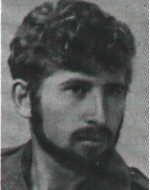Frish, Monique
Son of Yosef and Sheindl, a Holocaust survivor. Born in Lodz, Poland, on October 9, 1948, he began studying in Lodz at the YL Peretz School, where he immigrated to Israel in September 1957 with his family, who settled in Pardes Hanna. The elementary school “Merhavim”, starting in the third grade, soon became acclimatized in Israel and easily acquired the Hebrew language he had become accustomed to, and he was a talented and serious student who did not neglect his studies. He was interested in all sorts of activities – sports (soccer), chess, technical drawing, classical literature, mathematics, physics, etc. He also liked to spend time outdoors and go on trips. Monique chose the ORT school in Netanya and a year later switched to the electronic trend, and in 1966 he completed an electronics stage and decided to go to the IDF, To. Monique was drafted into the army in November 1966 and assigned to the Armored Corps. He did not aspire to a military career but wanted very much to do his duty as a citizen of the state and therefore he accepted compulsory service with love, knew how to joke and ignore difficulties and vacations at home did not mention anything about his difficulties. He knew how to calm the family with humor and joke, although he never underestimated his duties, as his comrades-in-arms and his direct commander testified. Monique participated in the Six-Day War and after the fighting was sent to a course of tank commanders and successfully completed it. After completing the course he was given the opportunity to instruct new recruits at the training base. Then he wrote to his battalion commander that he wanted to be sent to the Suez Canal, where his place was. The commander accepted his request and during the War of Attrition was most of the time on the front line. In his conversations with his friends he did not disparage the enemy. During his short vacations, he spent very little time in his house and spent most of the time at the beds of his wounded friends in the hospital. He was a brave soldier and a model friend. On the tenth of Tammuz 5729 (10.7.1969), he fell in battle in the area of the Suez Canal. That day, comrades-in-arms say, he appeared in the strongholds of Port Tawfiq and thus contributed to their morale. He was brought to rest at the military cemetery in Kiryat Shaul and was raised to the rank of First Sergeant after they fell. His commander spoke of his courage, his fighting spirit, and the discipline he knew how to maintain. The commander of the unit wrote in a letter of condolence to his parents: “Your son served as a tank commander in the unit and took part in almost all the battles in the Suez Canal. The “Merchavim” school published a booklet about him, in his memory.
